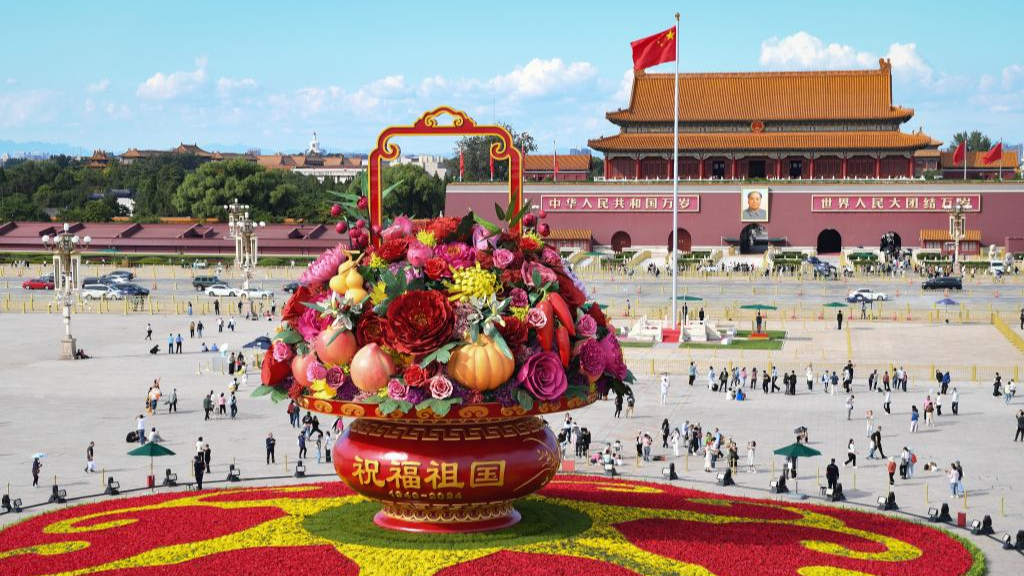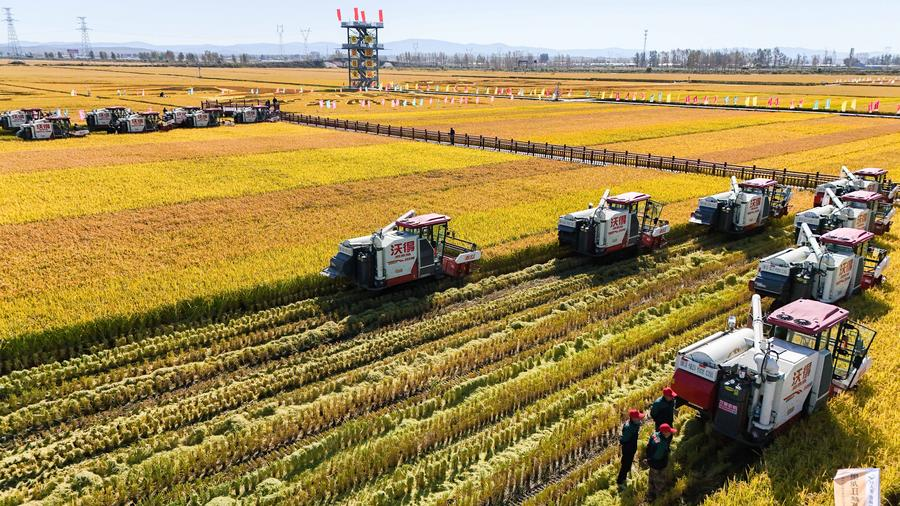
A "flower basket" at Tian'anmen Square in Beijing, capital of China, September 25, 2024. [Photo/Xinhua]
By Alexander Ayertey Odonkor
October 1, 2024, marks the 75th anniversary of the founding of the People's Republic of China (PRC). As part of activities to commemorate the anniversary, Chinese President Xi Jinping on September 29 presented medals to recipients of the national medals and honorary titles for their outstanding contributions to China's development. Over the past seven and half decades, China has embarked on an arduous journey of national development and modernization.
Under the leadership of the Communist Party of China (CPC), China has achieved the twin miracles of rapid economic growth and long-term stability – transforming from a poor developing country into the world's second-largest economy. As the Chinese proverb goes "the fire burns high when everyone brings wood to it." Since the founding of the PRC, the CPC, adhering to a people-centered perspective on development has united China's 56 ethnic groups and led the Chinese people in working assiduously to transform the fortunes of the country.
For example, seven decades ago China was home to an underfed population of 400 million. During this period, one of the frequently asked questions was "who will feed China"? However, since the CPC embarked on the new journey of agricultural development and carried out various reforms in the sector, China, though host to less than 10 percent of the world's arable land, at present feeds one-fifth of the world's entire population.
According to the Food and Agriculture Organization (FAO) of the United Nations, China ranks first in the world in terms of the production of cereals, cotton, fruits, vegetables, poultry, meat, eggs and fishery products – a commendable effort in the pursuit of food and nutrition security, not only in China but also for the entire world.

Harvesters working in a paddy field in Fangzheng County of Harbin, northeast China's Heilongjiang Province, September 22, 2024. [Photo/Xinhua]
Since its reform and opening-up in 1978, China, through various multilateral mechanisms, has established and enhanced agricultural cooperation with countries worldwide. For example, under the Belt and Road Initiative (BRI), the Asian country has so far signed agricultural and fishery cooperation agreements with more than 80 countries and initiated over 650 agricultural investment projects – making significant contributions to agricultural development worldwide.
Also, in the fields of science and technology, China, as in the case of agricultural development, has built close links with countries around the globe and increasingly allocated resources to advance research and development (R&D).
In recent decades, China has emerged as a global leader in R&D expenditure, only second to the U.S. Thanks to the country's rapidly expanding R&D investments, China has become a major driver of global innovation – rising from 34th position in the 2012 edition of the Global Innovation Index, an annual ranking of world economies based on their innovation capabilities, to take place 11th in the 2024 edition.
Benefiting from the burgeoning innovation capabilities, considered a key driving force of long-term growth and sustainable development, China shares the fruits of its innovation-driven growth with the rest of the world.
Over the past decade, the share of the Chinese economy in the world grew from 11.3 percent in 2012 to 17 percent in 2023, with the average annual contribution to global economic growth exceeding 30 percent. Additionally, the country's value share of the global manufacturing industry rose from 19 percent in 2010 to 34 percent in 2023.
In recent years, with China witnessing the transition from high-speed growth in GDP to a slower but more balanced and sustainable growth powered by the new quality productive forces – ultimately, the country's rapid technological advancements, is not only indispensable to achieving its second centenary goal of building China into a great modern socialist country but also increasingly crucial for opening up new opportunities for global growth.
A report released in August this year by the government-funded Australian Strategic Policy Institute's Critical Technology Tracker, which ranks countries' innovation capabilities based on the number of research paper citations in 64 technology categories, shows China took the first position in 57 areas – or nearly 90 percent of papers released between 2019 and 2023.
In just two decades, China transitioned to become a global leader in advanced technologies such as artificial intelligence, quantum computing and advanced aircraft engines. Considering the immense potential of these critical technologies, countries worldwide, particularly those in the Global South, could leapfrog traditional development barriers, if cooperation in technology transfer with China is established and enhanced.
Alexander Ayertey Odonkor, a special commentator on current affairs for CGTN, is a global economist with a keen interest in the social, environmental and economic landscape of both developing and developed countries, particularly in Asia, Africa and Europe.

 中文
中文



